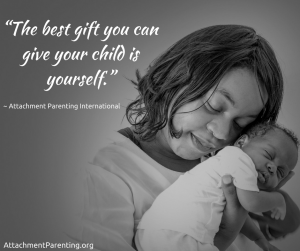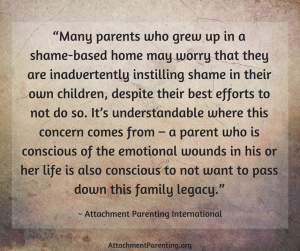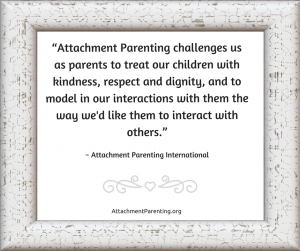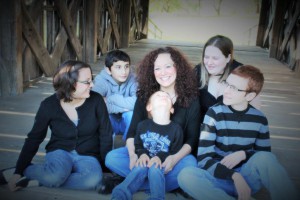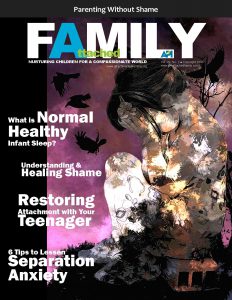 Editor’s note: This week, we offer you a 5-part series — originating in The Attached Family online magazine’s “Parenting Without Shame” issue — to help you better understand the development of toxic shame. Part 1 explained how trauma includes 3 components: Fear, Disconnection, and Shame. Part 2 explored Fear. Part 3 defined Disconnection. Part 4 discussed what it means to become “shame-based.” In this final Part 5, we take a look at the healing process.
Editor’s note: This week, we offer you a 5-part series — originating in The Attached Family online magazine’s “Parenting Without Shame” issue — to help you better understand the development of toxic shame. Part 1 explained how trauma includes 3 components: Fear, Disconnection, and Shame. Part 2 explored Fear. Part 3 defined Disconnection. Part 4 discussed what it means to become “shame-based.” In this final Part 5, we take a look at the healing process.
One of the challenges for healing of emotional trauma is that although trauma-worlds are created in response to external events, once established, they form rigid and closed internal systems.
Locked inside these systems, our behavior sets us up to be retraumatized by other people. Additionally, the ways that we behave toward ourselves are invariably retraumatizing. Trauma-worlds are self-perpetuating.
Locked inside these systems, we also struggle to see trauma for what it is. That leaves us little choice but to focus on the visible symptoms and the chronic, deadening pain they create.
Healing Doesn’t Come Through Symptom Relief
 Symptoms of emotional trauma include the fear, disconnection, and shame that lie at the heart of a trauma-world; also depression, meaninglessness, addictions, self-harm, rage, and unexplained physical pain, and ailments. Additionally, we are likely to struggle in our relationships and to sabotage things we care about. This is why family therapy is extremely important. Once started, your therapist may recommend individual children’s therapy.
Symptoms of emotional trauma include the fear, disconnection, and shame that lie at the heart of a trauma-world; also depression, meaninglessness, addictions, self-harm, rage, and unexplained physical pain, and ailments. Additionally, we are likely to struggle in our relationships and to sabotage things we care about. This is why family therapy is extremely important. Once started, your therapist may recommend individual children’s therapy.
Focusing on such symptoms, we — as individuals and as a society — put our resources into trying to alleviate them, perhaps through short-term family therapy or psychotherapeutic drugs, or by pinning our hopes to something like success at work, a new romantic relationship, losing weight, or cosmetic surgery.
These “symptom relievers” can give us temporary respite, but it won’t free us from the internal systems that were set up in the wake of the traumatizing experiences, so in time, we fall back into our suffering.
Even when we can see beneath the symptoms to the underlying traumatizing experiences, we are unlikely to recognize the trauma-worlds in which we are living, so our first port of call is to blame whoever, or whatever, caused the original wounds and look for retribution.
That is a valuable first step and a necessary part of the process, for we do need to recognize what happened to us. We need to validate the experience and understand that it was not our fault. However, focusing on the traumatizing experience or on punishing the perpetrators is not enough by itself to bring deep healing, because that won’t change the embodied systems that form our trauma-worlds. It’s akin to being hit by a drunken driver and having our leg broken. Focusing on the accident and jailing the driver won’t heal our leg.
How Healing Happens
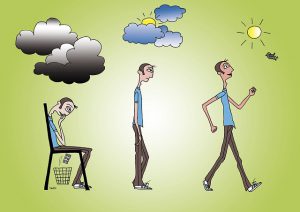 Healing trauma requires the courage to recognize that ultimately our lives are compromised not by the original traumatizing experiences themselves, but by the trauma-world that is created by our own minds and bodies as a response to those experiences. And we need to recognize this reality without blaming and judging ourselves — we need to understand that creating a trauma-world is what human beings do to survive.
Healing trauma requires the courage to recognize that ultimately our lives are compromised not by the original traumatizing experiences themselves, but by the trauma-world that is created by our own minds and bodies as a response to those experiences. And we need to recognize this reality without blaming and judging ourselves — we need to understand that creating a trauma-world is what human beings do to survive.
At the same time, we have to take responsibility for our healing, and for moving out of our trauma-worlds.
Developing a cognitive awareness of the original traumatizing experiences, and of the systems created in their wake, is a good start to the process of taking responsibility for our own healing. But it is not enough.
To create lasting change, we have to enter into our emotional minds and bodies and slowly become aware of what we carry from the inside.
That means opening to the original traumatizing pain and fear, learning how to tolerate it, and integrating it into our sense of who we are. It is only when we find ways of relating to our buried pain and fear that our lives are no longer organized around the imperative to avoid anything which might trigger what we carry in our depths. However, this is an extremely challenging process: We need to do it slowly, taking one small step at a time.
Equally crucial is that we work with the fear, disconnection, and shame that form our trauma-worlds:
- First, we must enter into these systems and become conscious of how we feel in both our minds and bodies when they are active.
- Then, we have to challenge our shame, reconnect to the exiled parts of ourselves, and learn to live with our sensitized fear system.
- Finally, we need to develop new, and healthier, ways to protect ourselves.
It is hard, daunting, and arduous work. Our trauma-worlds were created to survive overwhelming pain and fear. When we try to transform them, we are besieged with the conviction that we will be annihilated. That conviction leaves us at risk of sabotaging the healing process. Thus, we need patience, perseverance, determination, and courage.
It is also imperative that we have support and guidance from those who have been through the process themselves.
Do Not Do It Alone
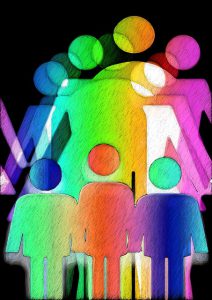 To heal trauma, we not only need an embodied consciousness of what we carry from our past, we also need new experiences. Real change happens in the present moment through lived experience.
To heal trauma, we not only need an embodied consciousness of what we carry from our past, we also need new experiences. Real change happens in the present moment through lived experience.
This need for new experiences is one of the many reasons why we can’t heal trauma alone. Emotional trauma arises because something has gone awry in our relationships, so a healing relationship is crucially important if we are to learn how to connect to other people and to ourselves in healthier ways. Similarly, we need support if we are going to approach the unprocessed pain and fear that was once unbearable, and we also need guidance if we are to transform the fearfulness, disconnection, and shame that lie at the heart of our trauma-worlds.
A healing relationship can be provided by a therapist, counselor, teacher, social worker, spiritual guide, or healing group — the label doesn’t matter. What does matter is that whoever is accompanying us has worked deeply with his or her own trauma. Healing trauma is akin to learning to speak a language like Chinese: It is not enough that our teacher has a theoretical knowledge of the grammar and that she can recognize the characters when they are written on the page; rather she must speak the language herself.
What It Means to be Healed
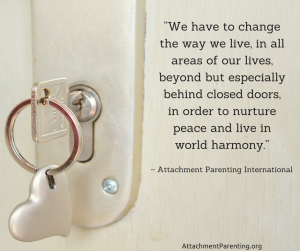 When we embark on trying to heal trauma, we typically imagine that we will reach a place where our lives are free from the suffering that arises from our wounds, and where trauma no longer has any effect on our lives.
When we embark on trying to heal trauma, we typically imagine that we will reach a place where our lives are free from the suffering that arises from our wounds, and where trauma no longer has any effect on our lives.
That is not what happens. We cannot change our past. Our trauma remains part of us. What can be changed is its impact. To achieve that, we have to find new and healthier ways of being with the pain and fear embedded in the traumatizing experiences, and just as importantly, we have to transform the trauma-world that developed around them.
It is a challenging process. It takes time. Many people, and indeed most public health services, look for an easier and faster route. But there is no easy route. To address trauma in a meaningful way, we need to commit ourselves to this challenge.
I believe it is vitally important that we make this commitment — not only to help ourselves — but also because when we carry unaddressed trauma, we have no choice but to relate to our children, family, neighbors, and colleagues in ways that are likely to result in them becoming traumatized.
In contrast, when we transform our trauma-worlds, we break that spiral and start relating to ourselves, other people, and the world around us in much healthier and more nurturing ways.
Photo sources: Pixabay.com
Editor’s note: Parent support makes a world of difference — when we strengthen families, we nurture and fulfill our children’s need for trust, respect, and affection, and ultimately provide a lifelong foundation for healthy, enduring relationships. Sharing our parenting experiences — the difficult, trying, joyous, and happy ones — with other like-minded parents can help us feel understood and supported. Attachment Parenting International (API) is dedicated to supporting families in realizing the most important job there is –raising compassionate kids who will shape the future of our world. Click here to find an API Support Group near you.

